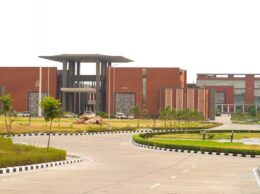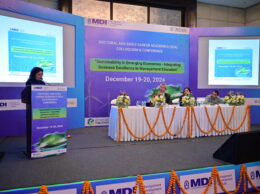Mandi, 6th June 2019: Indian Institute of Technology Mandi is launching a new B.Tech. programme in Engineering Physics from the next academic year (August 2019). The programme is being offered jointly by School of Basic Sciences (SBS), School of Computing and Electrical Engineering (SCEE) and the School of Engineering (SE) at IIT Mandi. The curriculum of Engineering Physics will introduce students to a wide variety of fields in pure as well as applied Physics.
A Bachelor’s in Engineering Physics will open several career paths in interdisciplinary areas such as Quantum Technology, Photonics, Nano-Electronics and Artificial Intelligence, which are promising to become dominant in the near future.
This course will prepare students to apply Physics to tackle these 21st century challenges. Additionally, this programme will also prepare students to pursue an advanced degree in Physics as well as in Engineering.
Speaking about the uniqueness of the programme, Dr. Pradeep Kumar, Course Coordinator, School of Basic Sciences, IIT Mandi, said, “21st century belongs to the interdisciplinary areas and Engineering Physics will act as catalyst to bridge the gap between basic science and traditional engineering disciplines to tackle the next generation technological challenges such Quantum technology, Artificial Intelligence”.
The core course will cover basic areas in Physics such as Quantum Mechanics, Condensed Matter Physics, as well as feature basic courses in Mathematics and Engineering. Besides a number of courses in Science and Engineering, courses from other branches like Humanities and Social Sciences will also be available as electives, under this programme. This broad base choice of courses will allow students to explore their areas of interest.
Speaking about the importance of this programme, Dr. Pradeep Parameswaran, Dean (Academics), IIT Mandi, said, “The principles of Physics are fundamental to the theory and practice of Engineering. IIT Mandi since its inception has believed in challenging rigid disciplinary boundaries, and our course offerings reflect our interdisciplinary outlook. Hence, we feel this Engineering Physics course will appeal to all stakeholders: potential students as well as employers in industry and academia.”
The Engineering Physics programme will enhance the cross-functionality and will bridge the gap between pure science and traditional engineering disciplines which so far have been pursued independently. This is necessary because in today’s world, major scientific and technological breakthroughs happen in a multidisciplinary environment where scientists from pure science work along with engineers. It is therefore highly important to inculcate both scientific and technological aspects, and the programme in the Engineering Physics will serve this purpose.









